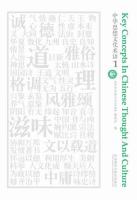笔记(共2773篇)
-
 吴双220540274
吴双220540274
-
用户639995
-
 窦婉铭
窦婉铭
-
 芽,
芽,
-
 棠棣
棠棣
-
用户824299
Moreover, the book’s editorial team deserves high praise for its commitment to accuracy and neutrality. Avoiding the pitfalls of cultural chauvinism or Western-centric bias, it presents each concept with scholarly objectivity, acknowledging both the richness of Chinese thought and the debates and controversies that have surrounded these terms throughout history.
-
用户824299
n conclusion, Key Concepts in Chinese Thought and Culture is an indispensable resource for anyone seeking to understand the intellectual foundations of Chinese civilization. It is a book that rewards careful reading, inviting readers to embark on a journey of discovery through the intricate web of ideas that have shaped one of the world’s oldest and most vibrant cultures. In an era where cross-cultural understanding is more important than ever, this book serves as a vital bridge, fostering mutual respect and appreciation between East and West. Whether you are a student of philosophy, a scholar of Asian studies, a translator, or simply a curious reader, this book will deepen your understanding of Chinese thought and enrich your perspective on the diversity of human wisdom. It is not just a reference book to be consulted; it is a treasure trove of insight to be savored and revisited time and again.
-
用户824299
n conclusion, Key Concepts in Chinese Thought and Culture is an indispensable resource for anyone seeking to understand the intellectual foundations of Chinese civilization. It is a book that rewards careful reading, inviting readers to embark on a journey of discovery through the intricate web of ideas that have shaped one of the world’s oldest and most vibrant cultures. In an era where cross-cultural understanding is more important than ever, this book serves as a vital bridge, fostering mutual respect and appreciation between East and West. Whether you are a student of philosophy, a scholar of Asian studies, a translator, or simply a curious reader, this book will deepen your understanding of Chinese thought and enrich your perspective on the diversity of human wisdom. It is not just a reference book to be consulted; it is a treasure trove of insight to be savored and revisited time and again.
-
杨奕纯
-
杨奕纯



 京公网安备 11010802032529号
京公网安备 11010802032529号